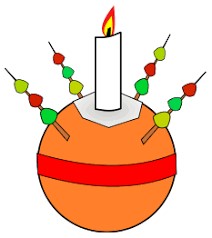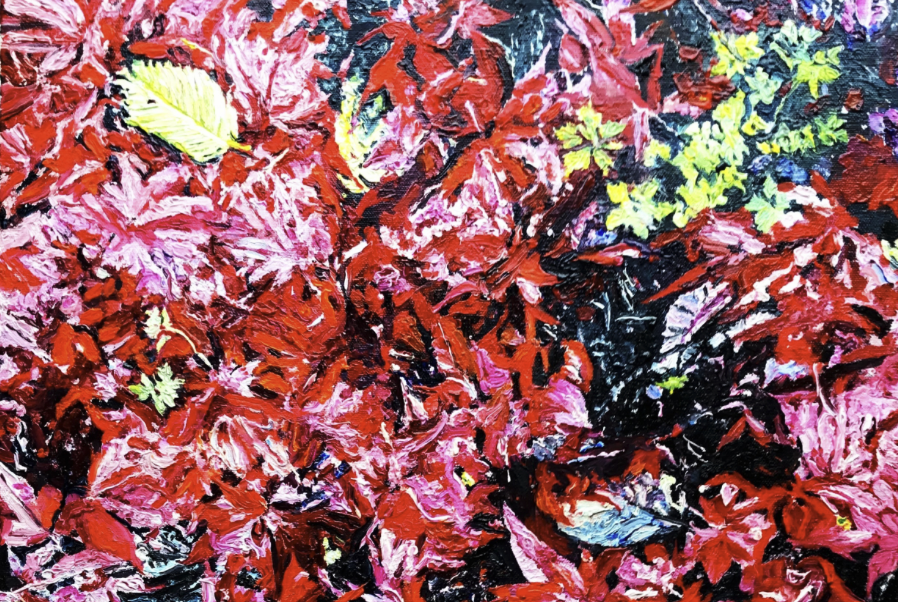Hope Through Action in Dark Times: A Climate Activist’s Faith Journey
350 Aotearoa Co-Director Alva Feldmeier reflects on maintaining hope and faith-driven climate action amid political setbacks, sharing insights from recent direct action at Denniston Plateau and the evolving intersection of spirituality and environmental justice.
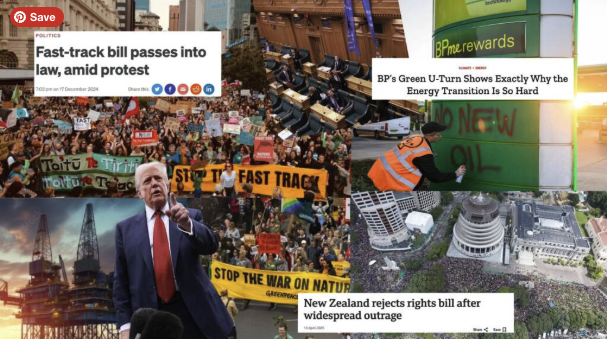
This reflection was delivered at St Lukes Presbyterian Church in Tāmaki Makaurau on Sunday, August 10th, 2025, as part of their morning worship service. Speaking to the congregation about Luke 12:22-31, Alva explores how Christian faith calls us to active engagement with the climate crisis, even when conventional political channels fail. Drawing on recent experiences, including direct action at Bathurst’s coal mine on the West Coast and the ensuing legal challenges, this reflection explores how climate activism can serve as a form of prayer and community building. As Co-Director of 350 Aotearoa, Alva offers both an honest assessment of recent political setbacks under New Zealand’s current government and a message of resilient hope rooted in faith-based action.
Good morning, St Luke’s. It’s wonderful to be back with you.
When I last spoke here at the end of 2023, my theme was “Hope through Action” – sharing about my journey into activism and the victories we’d won together. Today, I want to be honest with you about how much harder it’s been to hold onto that hope.
Since my last visit to your wonderful church, we’ve witnessed a wave of conservative governments elected around the world and a general shift back to the fossil fuel agenda. Internationally, major corporations are abandoning their climate commitments – BP, which once rebranded itself as “Beyond Petroleum,” now seems to be going “back to Petroleum.” Here in Aotearoa, we’ve seen this government reverse over 35 climate policies and counting, restore the offshore oil and gas ban that we fought so hard to achieve, and push through the Fast-track Bill that strips communities of their voice.

Just last week, when the government overturned the offshore oil and gas ban, I spoke with my colleague Fenton Lutunatabua from the Pacific Climate Warriors, who said: “Many will feel this bill is a betrayal to Pacific neighbours, but it is in fact a betrayal of their own future generations as well. We see the increased flooding in New Zealand, and we mirror that pain in our own storm surge and coastal inundation.” Powerful!
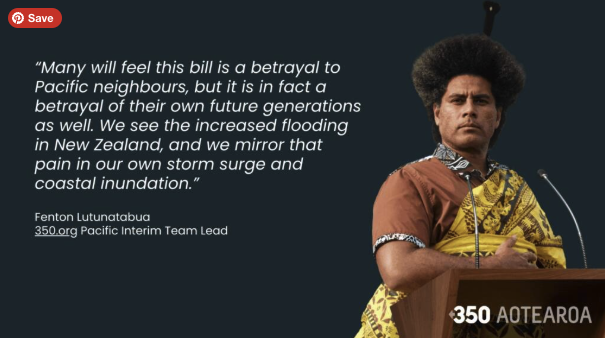
Some people don’t like hearing about politics from the pulpit. I understand that. But for me, my faith, my politics, and my actions are inseparable. When Jesus tells his disciples, “do not worry about your life, what you will eat, or about your body, what you will wear” – I hear this as a calling on us to trust in something greater than our immediate anxieties. “Consider the ravens,” he says, “they neither sow nor reap, they have neither storehouse nor barn, and yet God feeds them.” But then comes the challenge: “Instead, strive for his kindom.”
This isn’t passive waiting – it’s active striving for God’s kindom here on earth. When I read these words alongside his call to care for the least of these, to be good stewards of creation, to take up our cross to follow him – I can’t separate that from the climate crisis we’re facing.
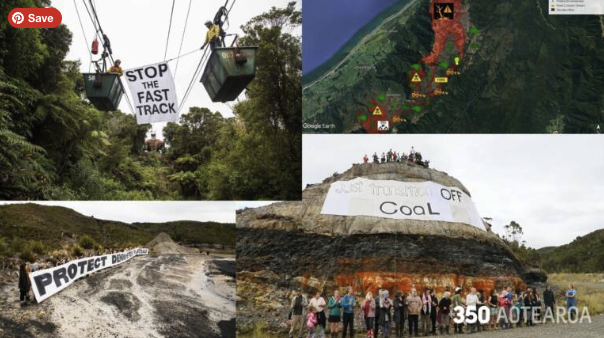
The work of 350 has had to pivot dramatically. Instead of just campaigning for the solutions we need, we’ve spent the past couple of years opposing harmful policies and protecting what’s left. This led me and over 70 others to Denniston Plateau over Easter weekend, where I joined others in directly disrupting the expansion of the coal mine there. I’m currently facing charges for the role I played in that action.
Standing on this pristine plateau – with its unique landscape of vast sandstone pavements, fragile wetlands, and historically rare ecosystems – and knowing it is about to be destroyed for coal that will accelerate the climate crisis, I felt called to put my body on the line. Central to following Jesus is taking up our cross – understanding that if we follow him, we will make sacrifices for the betterment of the world. I think that, as climate activists understand this too, sometimes we must risk our own comfort, our own safety, for future generations who didn’t create this crisis. It wasn’t a decision I took lightly. But my faith is not just a belief; it is putting love into motion. When building movement power through conventional channels isn’t enough – when we’re stripped of having a say through proper democratic processes – sometimes faithful action requires direct interruption of harm.
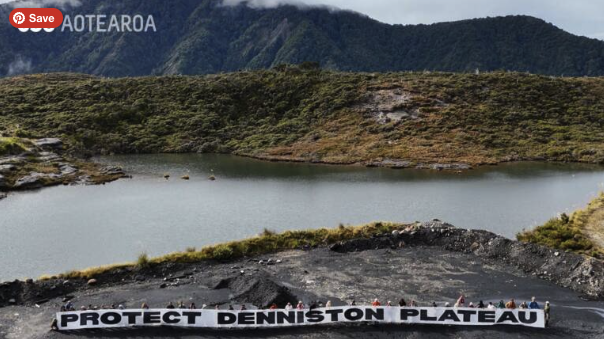
The pushback has been intense, the threats real, the legal battle overwhelming. But this needed to happen to force open the hard conversations we need to have as a society about what truly matters. Climate change is going to force these conversations anyway and be far more destructive in the process.
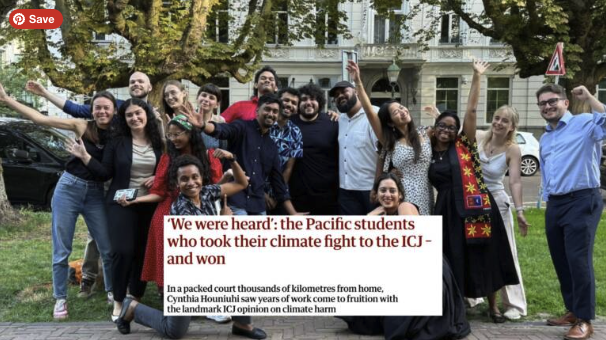
What gives me hope in these dark times is witnessing the profound shifts happening within movements for justice. I think of the Pacific students who took their case to the International Court of Justice and won a historic victory, establishing that nations have legal obligations to protect the climate for present and future generations. I’m seeing more unity, more intersectionality – people understanding the connections between climate, colonialism, inequality, and other justice issues. Instead of focusing on insular solutions that benefit some while leaving others behind, I’m seeing us working together more to ensure no one is abandoned.
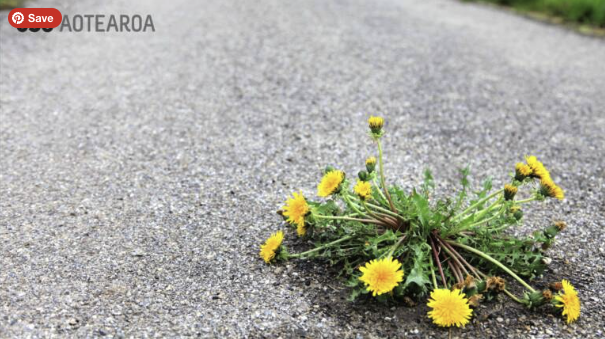
The image of the dandelion comes to mind – a flower that can break through concrete. Despite everything, I see concrete beginning to crack in the systems that have brought us to this crisis. The communities I’m part of give me faith – my faith community at St Heliers, who just last weekend celebrated the solar project bringing emissions reductions and resilience to our parish. And my activist community, who in the face of adversity are stepping up – being bolder, louder, and more resilient. Like Rach and Tāmati, who just spent their 13th night in a coal bucket at Stockton mine to directly disrupting their operations and drawing attention to the proposed coal mine.
The Pacific Climate Warriors taught me that reclaiming the narrative matters. Their declaration “We are not drowning, we are fighting” carries within it both an exposure of power dynamics – that those least responsible for climate change will fight those who caused it – and a powerful message of hope that refuses to give in to fear or despair.
Climate action, for me, has become a form of active prayer. You’re out there in the world, putting yourself forward, orienting your life toward righteousness, justice, love. Like worship, it’s a ritual of aligning your actions with your values, in community. The outcomes aren’t always obvious – it takes years to see results – but the transformative impact on ourselves and our communities is profound.
As people committed to seeing justice and peace flow through our communities, we’re called to continue seeking ways we can act together and foster our collective hope for the future. Whether that’s through supporting renewable energy projects, changing where we bank, joining campaigns, or simply opening our hearts to the connections between our faith and the world’s deepest needs.
We can’t wait for our vision of a better world to magically appear. But we can work together to build it ourselves – we can inspire others, get our communities involved, use the resources given to us, and be both warriors and world builders.
The path ahead is challenging, but as followers of the one who conquered death itself, we know that even in the darkest times, light finds a way through. Our hope is not in naive optimism, but in the transformative power of faithful action, taken together.
Thank you
Alva




